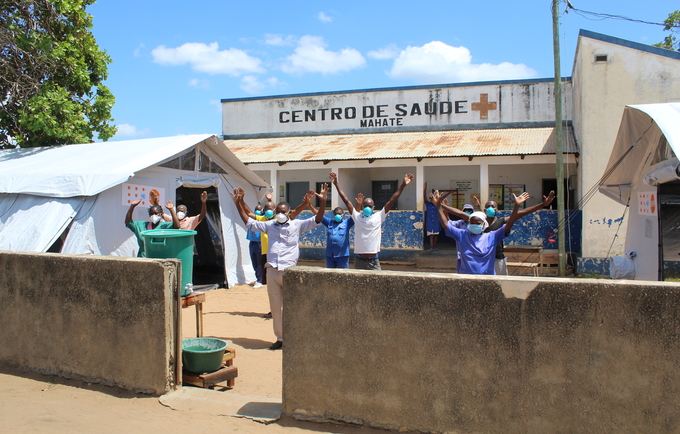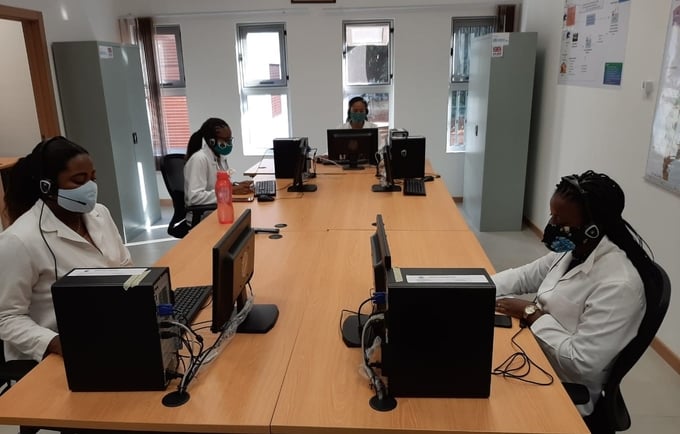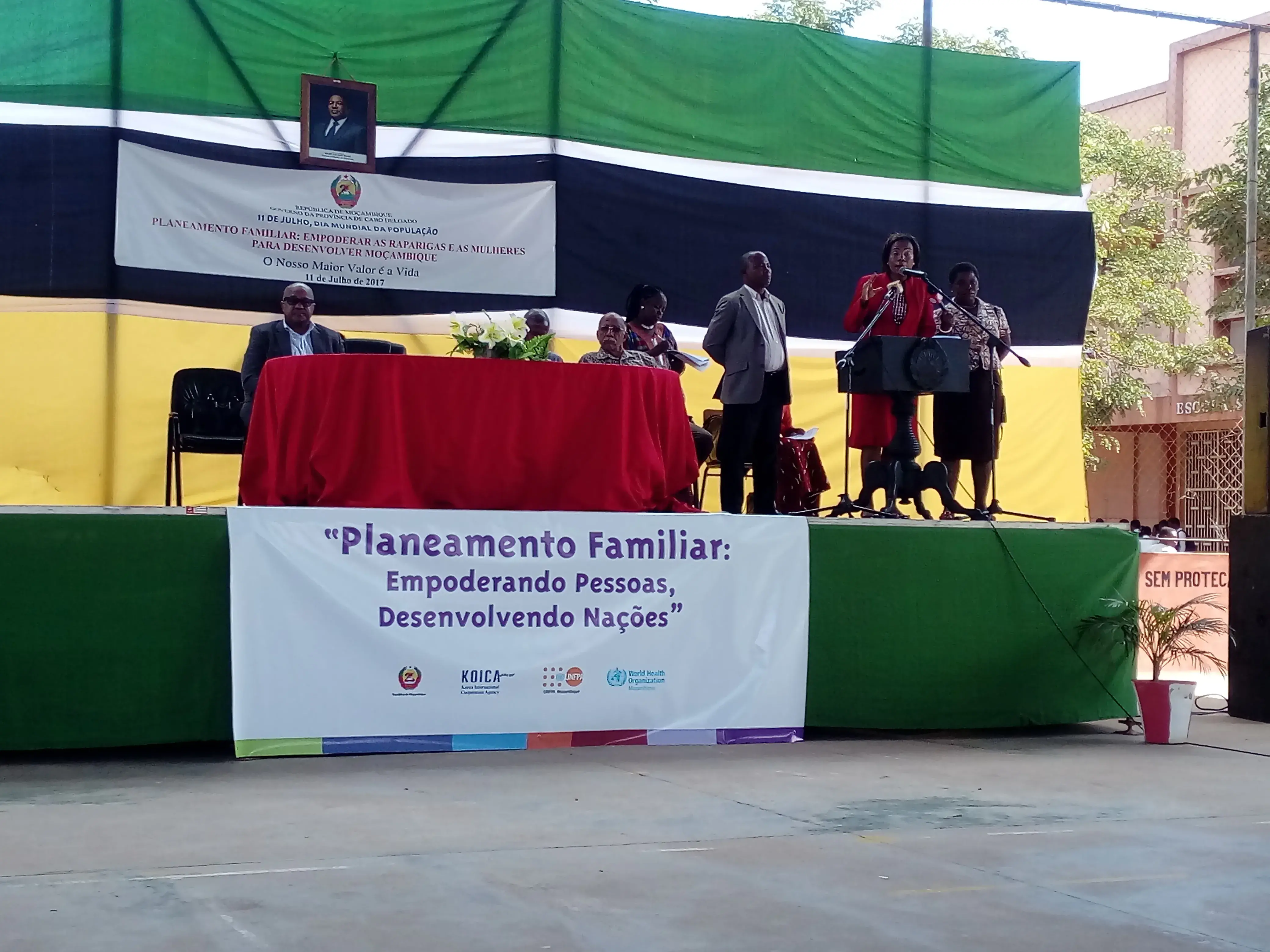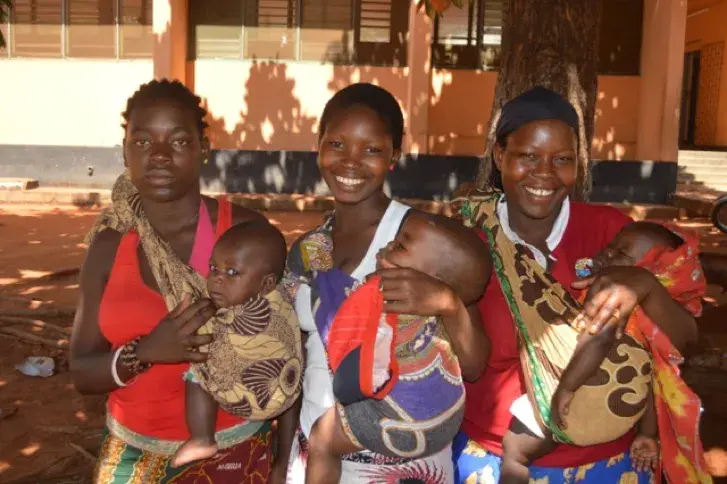In Mozambique, 2020 was a year of overlapping and complex humanitarian crises - from the covid-19 pandemic to growing insecurity in Cabo Delgado and continued recovery from 2019’s Cyclones Idai and Kenneth. Amidst these challenging circumstances, UNFPA was on the frontlines, supporting the Government of Mozambique and partners to ensure continuity of life-saving services and respond to the acute, unique, and emerging needs of women, girls, young people and the most vulnerable.
Amidst challenges and unexpected moments, 2020 reinforced our ability to work stronger together as we work towards achieving three transformative results: zero preventable maternal deaths, zero unmet need for family planning and zero gender-based violence and harmful practices against women and girls.
With the funding support and commitment of our donors, UNFPA Mozambique - through the Government and NGO partners - helped to achieve the following:
Protect health care workers and ensure service continuity during the pandemic

Through funding from Government donors (including Canada, Norway, the United Kingdom, Korea, China and the Netherlands) along with funding from OCHA (CERF) and UNFPA’s Emergency Response Fund (ERF), UNFPA Mozambique supported provincial governments in Sofala, Cabo Delgado, Nampula and Niassa provinces to deliver and install tents set within health units and hospitals impacted by conflict or natural disasters. The tents, which supported tens of thousands of women and girls, have been crucial for COVID-19 prevention, enabling adequate distancing and adherence to safety measures.
“With new tents, we isolate patients and separate the services, prioritizing the protection of women and girls who are seeking maternal and child health consultations, for example,” shared Rodrigues Armando, Director of the Mahate Health Center in Cabo Delgado.
Focusing on protecting front-line health workers and ensuring continuity of services, UNFPA Mozambique worked with partners to procure and distribute personal protective equipment for staff, deliver essential medicines to avoid stock-outs, procure ambulance boats and train service providers on how to respond to an increase in violence through psychosocial support and alternative sexual and reproductive care.
Scale-up innovation and digital technology to improve quality and availability of services


Since May 2020, more than 330,000 calls were made to the COVID-19 call center, enabling citizens in Mozambique to receive medical support, advice, and referrals in real-time from medical clinicians, from the center launched by the Government of Mozambique, with funding support from the United Kingdom and the United States Center for Disease Control and Prevention (CDC).
“It is gratifying to know that we are contributing to locating suspected cases of the virus and providing psychological support to the population in this difficult time,” says Nilam Arvinkumar, a female call center operator.
In addition to the call-center, and through the EU-funded Spotlight Initiative, UNFPA Mozambique supported the Ministry of Interior to scale-up InfoViolência, a digital tool to register and manage cases of gender-based violence. With a continued focus on technology and innovation, InfoViolência represents an important step in the country’s ability to better support victims and manage, analyze, and use data on violence cases.
Deliver health and protection care to isolated communities

Led by the Ministry of Health, UNFPA supported the deployment of mobile health clinics to deliver sexual and reproductive health and gender-based violence prevention and response services to displaced and vulnerable women and girls living in hard-to-reach areas.
From Cabo Delgado to Nampula provinces, the governments of Norway, the United Kingdom, Netherlands, and the UN Central Emergency Response Fund (CERF, OCHA) and UNFPA’s Emergency Response Fund (ERF), have supported mobile health teams to provide women and girls with services including ante-natal care and contraceptives. Recognizing increased risks of insecurity, the trained clinicians in the mobile teams have also provided information, counselling and referrals of individuals experiencing various forms of violence.
By the end of December, mobile clinics provided remote-based care to 79,000 women and girls in Sofala and Cabo Delgado. These mobile clinics ensure that the most vulnerable - who may otherwise not have direct access to health centers - get life-saving health and protection support when they need it most.
Disseminate population and housing census data

“If a picture is worth a thousand words, then maps and interactive visualizations can be worth a thousand numbers,” shared Alessio Cangiano, Technical Advisor, Population & Development, UNFPA Mozambique
Mozambique’s Population and Housing Census was successfully enumerated in 2017 with technical and financial assistance from a multi-donor Trust Fund (including the Governments of Canada, Italy, Sweden, Norway, and the United Kingdom’s Foreign, Commonwealth and Development Office, FCDO).
Following the census data launch, UNFPA Mozambique supported the National Statistical Institute (INE) in 2020 to roll-out the census data, making information accessible and easy-to-read to citizens through the development of geo-referanced maps, highway census data posts, educational cartoon books for children, and a journalism competition focusing on the data.
The geo-referenced census maps were distributed to all 168 districts, and more than 20,000 people (including Government, civil society and students) were trained on statistics literacy. All of these activities aim to reiterate the importance and value of the census data and ensure the inclusion and representation of all Mozambicans.
Protect the health, safety, and well-being of conflict-affected women and girls

During conflicts, natural disasters, and public health emergencies, sexual and reproductive health needs are often overlooked – and with staggering consequences. Since the start of 2020, nearly 530,000 people have fled violence and conflict in Cabo Delgado, moving to inland areas and neighboring provinces, including Nampula and Niassa. Some families have traveled by foot, while thousands more arrived by boat after embarking on a perilous sea journey to the capital city of Pemba.
To address urgent needs of those on the move, and with funding support from Norway, CERF (OCHA) and Canada, UNFPA supported the Government to distribute female dignity kits to conflict and disaster-affected women and girls throughout 2020.
Those fleeing for safety often leave at moments notice, leaving behind essential personal items, and struggling to ensure their health and feminine hygiene. Dignity kits aim to lessen this burden by providing essential and culturally-appropriate items, including soap, reusable menstrual pads, capulanas (traditional cloths), underwear, and more.
These kits also contain items to help women and girls mitigate their risk of gender-based violence, including a flashlight and whistle, and information on where and how to access services.
Train and support mentors to offer mentorship support to young women and girls


"I have informed the girls from my safe space and other community members about how they can protect themselves from COVID-19...I am making sure that the girls continue to keep safe,” shared Rapariga Biz mentor, Amina, from Nampula province.
Amina is one of the 5,608 mentors under the Government-led sexual and reproductive health and rights programme for girls and young women, “Rapariga Biz”, who played a key role in 2020 educating their peers, families and communities about COVID-19.
Since late 2016, Rapariga Biz - a jointed United Nations program financed by the Governments of Sweden and Canada - has reached nearly 700,000 girls and young women between 10-24 years in Nampula and Zambezia provinces, empowering them with knowledge and information on sexual and reproductive health, gender-based violence, human rights, leadership, decision-making skills, and more.
In Cabo Delgado and Tete provinces, the MyChoice project - funded by the Kingdom of the Netherlands - also saw commendable impact in 2020. Training of mentors and activists equipped and supported 26,000 girls and young women (aged 10-24) to receive counselling and increase their awareness of family planning, so they can make informed decisions about their sexual and reproductive health and demand for services.
Similarly, trained activists supported by MyChoice delivered community-based family planning support to more than 26,000 adolescents and youth while mobile brigades delivered sexual and reproductive health care to more than 30,500 women and girls in Tete province.
In 2020, mentors and focal points responded to the pandemic by delivering their educational and counseling sessions via community radio, one-on-one distanced sessions, or by telephone.
Resume fistula repair surgeries and support survivors

“I now feel comfortable talking about fistula, because it is a reality and affects many women and adolescents”, said Fernanda, a survivor of obstetric fistula.
Following Mozambique’s first positive case of COVID-19 in late March and the subsequent declaration of a state of emergency, the Ministry of Health put in place regulations to curb the spread of the pandemic, including permitting only ‘emergency surgeries’ to take place. For a period of time, fistula repair surgeries - once considered to be ‘nonessential’ - were put on hold.
Following continued advocacy from stakeholders at all levels, the Government resumed fistula repair surgeries in mid-2020, enabling women who have endured years of suffering to repair their obstetric fistula and begin the process of re-integrating into society.
Driving awareness among girls and women around Obstetric Fistula is a step towards mitigating the impact of an entirely preventable condition. This, combined with increasing accessibility to high-quality medical care, have been two key goals of UNFPA’s work to support the Government of Mozambique, with funding from the Government of Canada.
From 2018 - 2020, UNFPA Mozambique supported the Government to carry out 2,067 fistula repair surgeries.
Equip Cyclone-affected women and girls with training and skills to become economically empowered

. 
“At my age, there are very few options for employment and I never went to school. Living in the accommodation center, I have been able to learn new skills that have helped me feed my family even during this pandemic,” says Amelia (photo, left)
At UNFPA-supported women-friendly spaces, Cyclone-affected women in 2020 began learning how to produce straw baskets, carpets and face masks that could be sold in their communities to generate a small personal income. Through UNFPA Mozambique, implementing partners procured and provided raw materials, sewing machines and basic business training for women and girls based in accommodation centers and visiting safe spaces.
Through funding support from Norway, Canada, UN CERF (OCHA) and UNFPA’s ERF, women and girls have become more economically empowered and independent as they transition from a post-disaster phase to one of recovery and resilience.
In the aftermath of Cyclones Idai and Kenneth, which made landfall in 2019, UNFPA has provided more than 1.1 million services to approximately 400,000 people in need.
Procure and distribute vital family planning commodities

UNFPA Supplies, a division of UNFPA, provides support to countries like Mozambique in procuring needed reproductive health supplies, tracking contraceptive availability, training health providers, and ensuring access to contraceptives, up to the last mile.
In 2020, UNFPA Supplies contributed more than $3 million USD for reproductive health commodities in Mozambique (or 31% of the contraceptives purchased and delivered in the country). Through UNFPA Supplies, the agency also supported the Government of Mozambique to reach 203,000 additional new users of modern contraception.
The program provided technical and financial support to the Government to establish a medicine management and monitoring system and provide on-site training for health staff in 33 new health facilities and pharmacists, warehouse, and family planning focal points on supply chain management.
Support, through programs like UNFPA Supplies, is estimated to have prevented nationally*:
- 73,000 unintended pregnancies due to modern contraceptive use
- 16,000 unsafe abortions due to modern contraceptive use
- 200 maternal deaths
*Results of the UNFPA supply program only, not UNFPA as a whole. Statistics are calculated via FP2020.
----
We thank our 2020 donors donors who put women, girls, and youth at the core - ensuring we leave no one behind as we accelerate progress towards the 2030 Sustainable Development Goals:
Kingdom of Belgium, Government of Canada, People’s Republic of China, European Union, Government of Flanders, Government of Italy, Republic of Korea, Kingdom of the Netherlands, Government of Norway, Government of Spain, Government of Sweden, The United Kingdom, World Bank, CERF (UN OCHA), Donors from UNFPA’s Emergency Response Fund and Multi-Donor and Partner Trust Fund donors.




